best off grid solar system
What is Off Grid Solar System?
An off grid solar system is a type of solar power system that operates independently of the electrical grid. Also referred to as a stand-alone system, it is not connected to the conventional power grid. It uses off grid solar kits, battery storage, and other equipment to generate, store, and supply solar energy onsite. Off grid power system is designed to generate and store electricity for use in locations where a connection to the grid is either unavailable or not feasible.Solar panels capture sunlight and convert it into electricity, off-grid solar system packages with batteries for use during nighttime or cloudy conditions. The inverter can convert DC power into AC power, which can be used in homes, RV, camping,marine or other off-grid application scenarios.
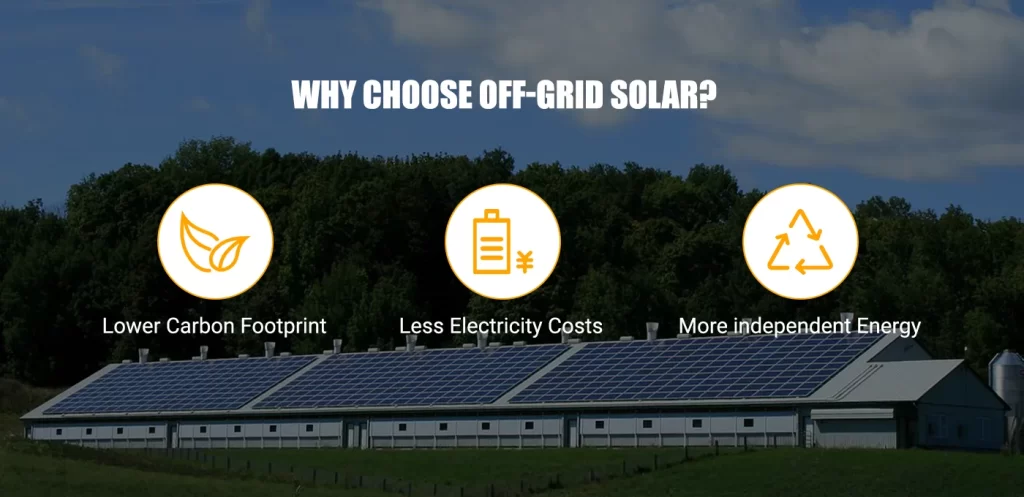
SUNGOLD's Best Off Grid Solar System
With 15 years of solar panel manufacturing experience, advanced and mature off grid solar kits production technology and a wealth of customer case studies, Sungold Solar provides leading off-grid solar system solutions for customers in North America.
Sungold offers a full range of high quality solar panels, inverters, controllers, and power accessories – providing you with reliable and cost-effective mobile power solutions even in off-grid environments.
Sungold is constantly optimizing its product technology and expanding its product range in response to user experience and market demand, providing off-grid power solutions for RV owners, camping enthusiasts, outdoor explorers, marine enthusiasts, and user else in an off-grid environment.
4 Benefits of off grid solar system solutions
- Avoid power outages:
Power outages can be stressful and inconvenient, however, with an off-grid solar system, you can have backup energy storage even in the most remote rural areas.
- Reduce electricity costs:
Since solar energy is generated for free, it means no longer tied to the national grid. As a result you are basically free of electricity bills!
- Gain complete energy independence:
Get rid of all the taxes that come with the national grid and fossil fuel energy. Allows you to monitor and control how your energy is used
- Minimize your carbon footprint:
Off-grid solar systems use solar power to generate electricity, and as a renewable energy source, it is sustainable and does not produce any harmful toxins.
How Does Off Grid Solar System Work?
Off grid solar system work by utilizing solar panels to generate electricity, which is stored in a battery for use when the sun is not shining. The solar panels are utilized to generate electricity, which is then used to charge the solar batteries through a charger controller. The electricity is then converted through an inverter to power appliances in the home or business.Off-grid systems store electricity in batteries so that even in winter or cloudy weather there is enough power to meet electricity needs.
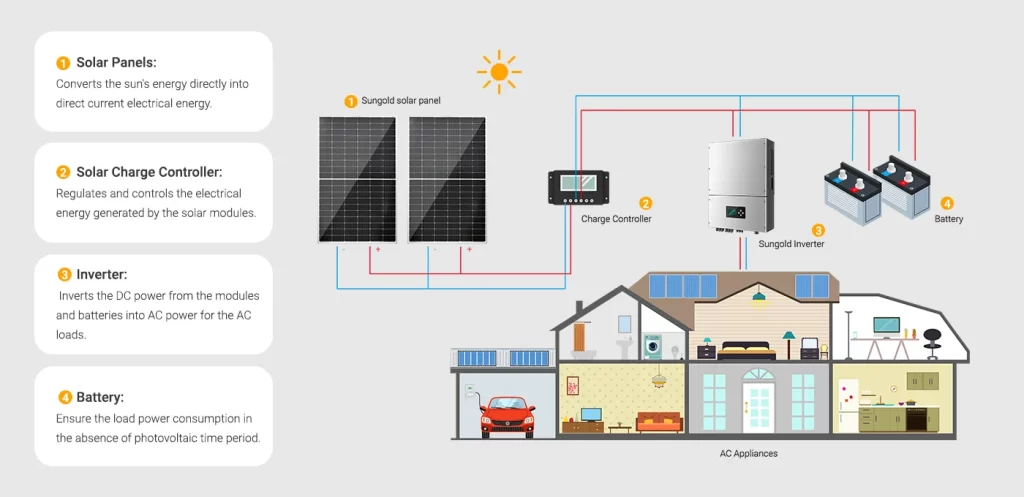
What’s in Off Grid Solar System?
All off grid solar system include 4 major components: solar panels, a charge controller, a battery, and an inverter.
solar panel

Solar charge controller
Solar charge controller is an important device used in solar power generation systems. Its role is to manage and regulate the electrical energy collected by solar panels to ensure safe charging of the battery and extend the life of the battery. Solar charge controllers usually include charging mode selection, battery overcharge and over-discharge protection, load control and other functions. These controllers are usually classified based on their operating voltage (12V, 24V, 48V, etc.), current capacity, and functional characteristics. Some common solar charge controller brands include Morningstar, OutBack Power, Victron Energy, etc.
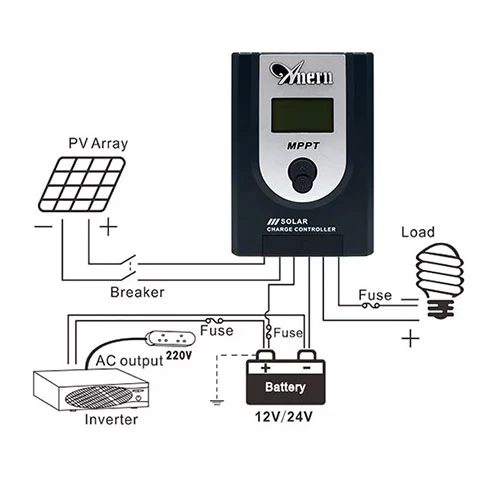
solar battery
A solar cell is a device that converts solar energy into electrical energy. They are often used to store solar energy to provide power at night or when it is cloudy. Solar cells usually consist of solar panels, charge controllers and batteries. Solar panels generate electricity by absorbing photons from the sun's energy, and charge controllers manage the charging process of batteries, which store electricity for daily use. These batteries are widely used in outdoor solar systems, solar power stations, and portable solar equipment. They help reduce reliance on traditional power sources, reduce energy costs, and reduce environmental impact.
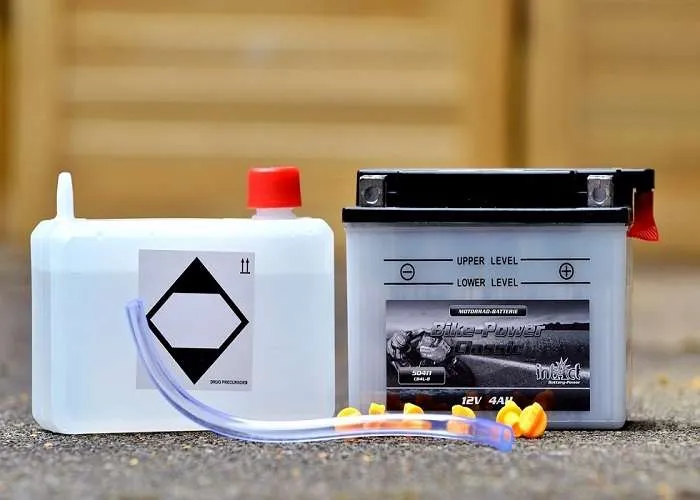
solar inverter
A solar inverter or photovoltaic (PV) inverter is a type of power inverter which converts the variable direct current (DC) output of a photovoltaic solar panel into a utility frequency alternating current (AC) that can be fed into a commercial electrical grid or used by a local, off-grid electrical network. It is a critical balance of system (BOS)–component in a photovoltaic system, allowing the use of ordinary AC-powered equipment. Solar power inverters have special functions adapted for use with photovoltaic arrays, including maximum power point tracking and anti-islanding protection.
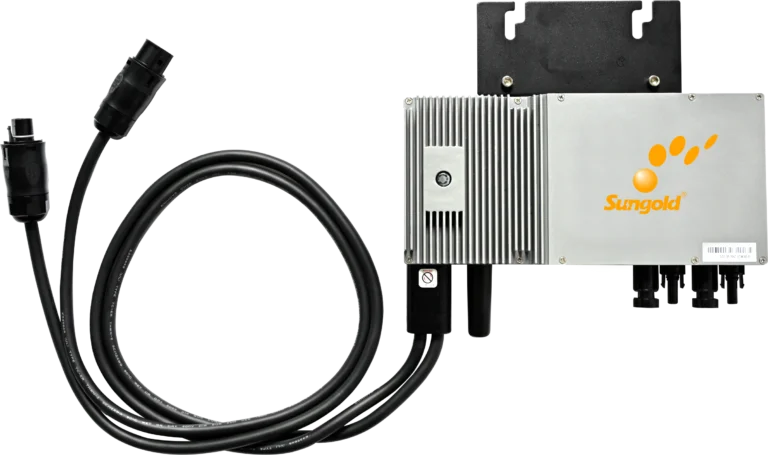
Sungold Off Grid Solar System Application
Sungold has accumulated off grid solar system for a variety of scenarios, providing users with high-quality products and considerate services.
RV
CAMPING
marine
Riding
Read More From sungold
Are you dreaming of living off-grid and becoming energy-independent? Transitioning to an off-grid lifestyle powered by solar energy is an exciting journey, but one of the most common questions is, “How many solar panels do I need to go off-grid?” The answer depends on several factors, including your energy consumption, sunlight exposure, and the components of […]
Portable solar battery chargers have become very popular among backpackers due to their ability to absorb sunlight and convert it into electricity. This feature makes them especially useful for long-distance trips, ensuring you never run out of power for your devices, no matter where you are. If you’re considering investing in a solar battery charger […]
How to Use Solar Power in Your RV: How Many Solar Panels Does Your RV Need? A solar panel system for your RV is perfect for off-grid living and camping in nature. Solar panels on your RV can provide power anywhere in the world, greatly expanding your camping options. However, connecting solar power to your […]
As technology advances, solar-powered security cameras have become an integral part of modern home and business security systems. These cameras are environmentally friendly and energy-efficient, making them perfect for areas where electricity is scarce or for remote monitoring. Let’s dive deeper into how solar-powered security cameras work and their pros and cons. What are Solar-Powered […]
Final Answer: A 50~100 watt solar panel can run small devices for charging, lighting, and coolers for basic camping needs. Solar panels of 200 watts or 400w solar panels are needed to run high power consuming devices such as refrigerators or grills. Based on past camping experiences, short-term camping requires about 50-100 watts of solar […]
FAQ
There are two main types of solar power generation systems (also called photovoltaic power generation systems) - off-grid and grid-connected. What is the difference between them?
First of all, "network" refers to the State Grid. Then it can be concluded from literal understanding,
Grid connection means that the electricity generated by solar energy is integrated into the national grid for transmission and use.
Off-grid refers to being separated from the national grid and forming a self-sufficient power system through battery storage and inverter conversion.
Most data suggests that a typical American home (2,000 square feet home) consumes approximately 11,000 kilowatt-hours annually. So, when we divide our total consumption by the expected output of one solar panel, we see that roughly thirteen solar panels of this size would be enough to power a home of that size
Solar panels need to store the energy they create somewhere. Storage takes place in solar batteries or a portable power station. A single battery should suffice if you want a backup for personal devices and essential appliances when the grid goes down. However, if you want to go off-grid entirely, you could need as many as twelve solar batteries (or more, depending on capacity) to ensure you have enough power to keep you going. The right number ultimately depends on your energy consumption needs and the capacity of the batteries.
An off grid solar system is an energy system that operates independently and does not rely on the power grid. Here are some pros and cons of off-grid solar systems:
advantage:
Independence: Off-grid solar systems can operate where there is no grid power, making them suitable for remote areas and off-island locations.
Renewable Energy: Solar energy is a renewable energy source that does not run out, helping to reduce dependence on finite fossil fuels.
Reduce Electricity Bills: Off-grid systems can reduce energy bills because you generate your own electricity.
Environmentally Friendly: Solar energy systems reduce greenhouse gas emissions and help protect the environment.
shortcoming:
High initial investment: Installing an off-grid solar system typically requires high initial costs, including solar panels, batteries, and inverters.
Unstable power supply: Unstable weather will affect power production, requiring backup power generation equipment or large-capacity batteries to maintain stable power supply.
Maintenance and replacement costs: Solar panels and batteries require regular maintenance and replacement, which can increase operating costs.
Energy storage limitations: Off-grid systems have limited battery capacity and may not be able to meet high energy demands.
batteries.
Living off the grid refers to a situation where a property or community is not connected to or served by publicly or privately managed utilities such as electricity, gas, or water. Off-grid systems consist of numerous self-producers and independent power plants in rural or isolated areas. These systems are often used in preference to on-grid systems for a variety of reasons.
LEAVE A MESSAGE
If you are interested in our products and want to know more details,please leave a message here,we will reply you as soon as we can.







